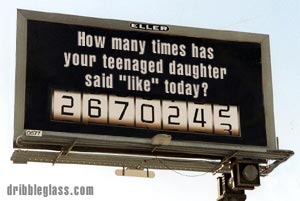
"You know..."
A college student, giving a presentation in my seminar class, used the phrase "You know" 57 times in 30 minutes. That is roughly once every 31 seconds. Most of the time, when she said "you know," she was talking about something that I didn't know. If she really thought we knew it, then she should have talked about something we didn't know.
This experience got me to wondering why so many people sprinkle their conversations with "you know." Perhaps it is just filler. I have a theory that people use familiar expressions to fill in the gaps in what they are saying while their minds work on what to say next. "You know" is the hamburger helper of language.
I can still remember when the expression "like" was an addiction of the younger crowd. Like–man, it seems like just yesterday. I have assumed these annoying linguistic idiosyncrasies to be a vestige of youth and immaturity, and that people will eventually abandon their use once their confidence and skill with the language increases. I may be wrong about that. While driving home from work tonight I was listening to an interview on National Public Radio. The actor being interviewed used the "you know" expression even more frequently than my student did.
For a few years now I have been distracted from annoyance by the "you know" crowd due to people incorrectly saying "lay" in situations where "lie" is the proper word. That has become so pervasive that I see no hope of it ever becoming properly used. I expect the purveyors of correct English usage will soon change the rules. I'm not sure whom these purveyors are, where they are, or how they make their changes known, but I am fairly certain that they will cave in from the pressure of bad English and change the rules so that bad English (telling your dog to lay down, instead of lie down) will become proper English. It is equivalent to changing your name because many people mispronounce it.
The dictionary continues to be expanded with words and expressions that were formerly "coined" or misused. I had a mental list of many of the illegitimate words that bugged me. But they have become so common that I no longer recall which words were proper and which became so through a democratic process of misuse. But then if you research the history of language, all words arrived by that process. Perhaps the first word to be legitimized was a grunt.
This process of language building through misuse really annoys me, and logical analysis isn't helping me deal with it. I was relating this to a scholarly friend of mine, but he wasn't very sympathetic to my concerns. He told me, "Hey man, like, you know, get over it. Leave it lay."